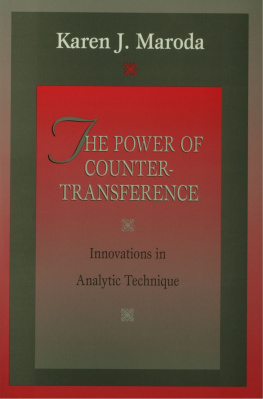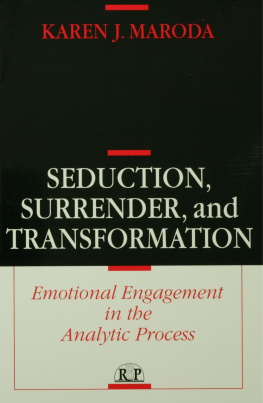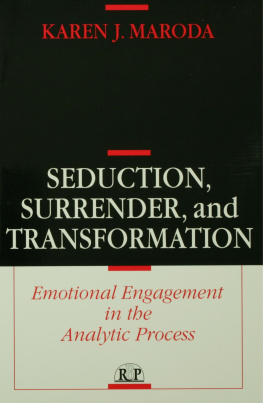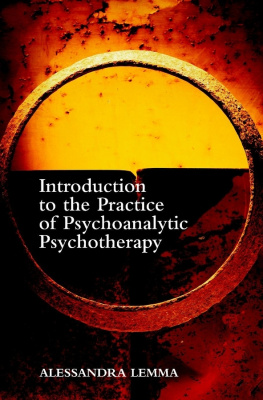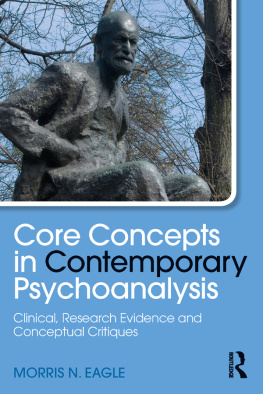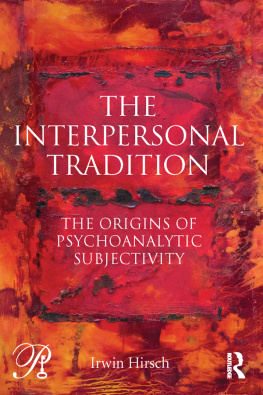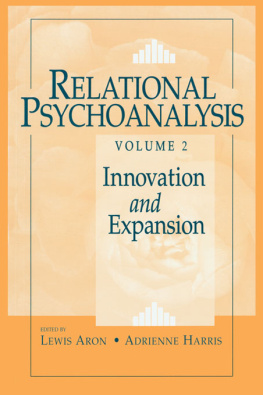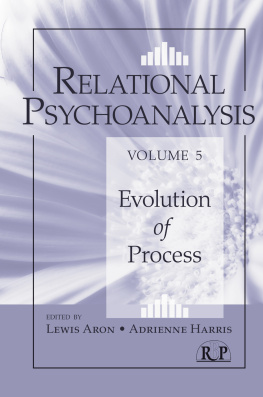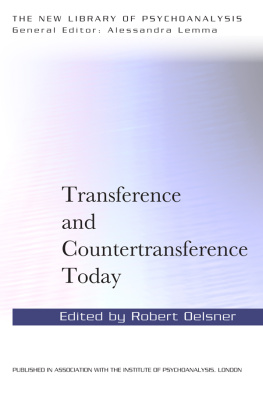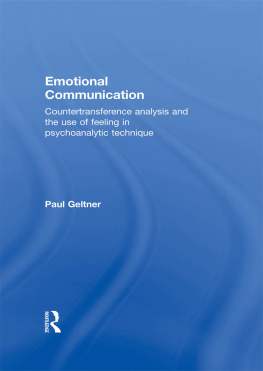Karen J. Maroda
All rights reserved. No part of this book may be reproduced in any form: by photostat, microform, retrieval system, or any other means, without the prior written permission of the publisher.
Published by The Analytic Press, Inc.
101 West Street, Hillsdale, NJ 07642
www.analyticpress.com
Maroda, Karen J.
The power of countertransference: innovations in analytic
technique / Karen J. Maroda. - 2nd ed., rev. & enl.
p. cm.
Includes bibliographical references and index.
ISBN 0-88163-414-X (alk. Paper)
1. Countertransference (Psychology) 2. Psychoanalysis. I. Title
RC489.C68M37 2004
616.89' 17dc21
I have always believed that any significant accomplishment by any individual was made possible by the avid support of one, or many, friends, family members or colleagues. Unquestionably this book would not exist without the contributions of the fine people I have worked with and loved over the years. In addition to all of my patients I would like to thank the following people.
Johanna Krout Tabin, PhD for her reading and critique of the first draft of the manuscript, and for her continuing support and friendship. Her keen eye helped maintain the focus of the book and her clinical expertise served to let me know when points needed to be elucidated and when clinical examples were needed. In addition to her professional skills, I am grateful for the great care and time she took from a busy schedule to help make this book all that it could be.
L. David Levi, MD, who for the past ten years has challenged and debated my ideas with me, helping to forge the strong convictions I now have. He continues to enrich my personal and professional life in a way that few have.
Mary Alice Houghton, MD, for her careful reading and critique of the first draft of the manuscript, and for her friendship and enthusiasm.
Also, John Gilligan, PhD, Michael Osborn, PhD, Gale Graubart-Roman, MA, and my loving family for their support and encouragement.
Finally, I would like to thank Glenys Parry, PhD, the previous European editor of the Wiley series in which this book appears, who discovered me when I presented a paper on countertransference at an APA convention. She immediately suggested that I write this book and initiated the steps leading to a contract. Without her there would be no book. So I am deeply grateful for her faith in my talent and hope that this book proves worthy of the confidence that she and all of the others mentioned here have placed in me.
KJM
October 20, 1990
With the shift from a one-person to a two-person psychology that has defined the relational turn in psychoanalysis has come a heightened attention to the personal involvement of patient and analyst and to the affective link between them. Karen Maroda has courageously called for emotional honesty and affective self-disclosure in the analytic encounter. While Maroda's work is profoundly personal and creative, more than that of other writers on psychotherapeutic methodology, she also insists that theorists of psychoanalytic technique articulate the principles that guide their clinical interventions so that these procedures can be taught and studied systematically. In this, her first book, The Power of Countertransference (1991) she began to outline her own systemalization of psychoanalytic technique, which was to be continued in numerous publications including her Seduction, Surrender, and Transformation (1999, The Analytic Press). This book made an immediate and important impact on the field of psychoanalytic technique and has been sought out by students and practitioners because of its clarity and persuasiveness. It is to the great crcdit of The Analytic Press that they have made it available in this new edition of The Power of Countertransference.
What are the actual clinical implications of a relational approach for psychoanalytic technique and practice? One of the unique features of relational psychoanalysis is that it docs not prescribe any singular correct practice. Relational theorists and practitioners suggest a range of clinical styles and forms of practice. Maroda proposes an original and thoroughly interactive model of psychoanalytic practice in which the patient learns through the medium of affective communicatiion with the analyst. Maroda's writing is consistently passionate, challenging, and provocative. Where psychoanalysis used to call for abstinence, neutrality, and anonymity, Maroda pushes for emotional honesty and personal availability.
While promoting radical mutuality and an interactive clinical methodology, Maroda never avoids or neglects the role of power and authority within the analytic dyad. She remains carefully attentive to the asymmetries of power and to the need to develop psychoanalytic principles of technique that protect the integrity of the analytic process. In this outstanding book, Maroda draws on her years of rcflcctive clinical practice to articulatc a systematic and highly disciplined clinical theory of technique. Maroda was among the first writers in the psychoanalytic community to spell out a methodical approach to the controversial topic of self-disclosure that has stimulated such debate in the psychoanalytic literature.
Harold Searles, who was one of the most important progenitors of relational psychoanalysis and perhaps the most significant early investigator of the usefulness of countertransference and the use of the self in psychotherapy, wrote a prepublication review of Maroda's book in 1991. He wrote:
To my mind, there is no dimension of psychoanalytic therapy and psychoanalysis more important than that of how, if at all, the therapist (or analyst) utilizes the feelings which he finds himself experiencing toward the patient. Most writings concerning this complex and highly controversial subject deal with it in at best a piecemeal and gingerly fashion.
Maroda has grasped this nettle in an extraordinarily courageous and honest and thoughtful way, has dissected it in a thoroughgoing fashion, and has given us, in this modest-sized book, the most comprehensive and lucid exposition of it available in our literature.
Searles went on to declare that this text, her first book, qualifies Maroda not only as a scholar, but as a "pioneer in the understanding of this analytic realm."
Maroda takes up what for me is an essential question for all psychotherapeutic practice, namely, what is a therapist to do with the feelings stirred up when working with patients? How best to use these feelings in the service of the patient's treatment? This bold and original book will help students and experienced clinicians to make better use of themselves and their own feelings and reactions to enhance their patients' treatments and improve their patients' lives.

